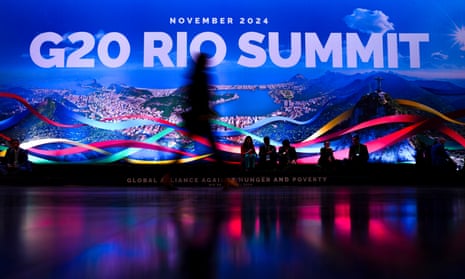Boost to Cop as G20 reaffirms transition from fossil fuels

Fiona Harvey
Good news for progress at Cop29 came not from Baku but from Rio de Janeiro early on the morning of day eight of the log jammed talks, writes Fiona Harvey, Guardian environment editor.
The G20 communique contained key lines on the climate that confirmed the world would transition away from fossil fuels.
The leaders of the G20 group of the biggest developed and developing economies met in Brazil to talk geopolitics, and climate was high on the agenda – despite the reluctance of countries such as Saudi Arabia, Russia and India.
At Baku, the Saudis have tried hard to unpick the resolution to transition away from fossil fuels, made a year ago. They tried to sideline it into discussions of finance at the early agenda meetings. A large coalition of developed and developing countries pushed back on this, keeping the transition language in play. But it has been a tough fight, with some delegations grumbling that the Cop presidency was not sufficiently on the ball on the issue.

The boost from the G20 will help those trying to get strong affirmatory language on the transition as a key outcome from Cop29.
The term “transition away from fossil fuels” was not in the G20 communique, but the document – signed off on by all G20 leaders – referred to the outcome of the Cop28 talks a year ago in Dubai. At that meeting, the resolution to “transition away from fossil fuels” was contained in paragraph 28 of the outcome under the “global stocktake”.
The G20 said:
We welcome and fully subscribe to the ambitious and balanced outcome of the UN Climate Change Conference in Dubai (COP28), in particular the UAE Consensus and its first Global Stocktake of the Paris Agreement (GST-1).
We will respond positively to the GST-1 encouragement for Parties to the Paris Agreement to come forward in their next nationally determined contributions with ambitious, economy-wide emission reduction targets, covering all greenhouse gases, sectors and categories and aligned with limiting global warming to 1.5 C, as informed by the latest science, in the light of different national circumstances.
It may seem convoluted, but this is a boost to Cop29 and this seeking to ensure the Cop28 resolution to transition away from fossil fuels is built on and not abandoned. Civil society groups cheered the move.
Jasper Inventor, Head of COP29 Greenpeace Delegation, said:
This is a positive signal from the G20, that despite their differences, they’ve reaffirmed their support for an agreement to be reached at Cop29 on the new climate finance goal. This momentum must now be translated into concrete outcomes in Baku. Amid slow Cop29 progress, the world must find ways to keep bridging divisions because the escalating climate impacts will not spare any country and jointly taking action is in all our best interests.
The finance goal to be agreed at Cop29 needs to significantly scale up public finance and it’s time for the polluting fossil fuel industry to pay up as a critical source of financing. We hope the G20 declaration will propel talks in Baku to the positive outcome the world desperately needs.
G20 reaffirmation of the Cop28 Global Stocktake and a commitment to respond to that in their climate action plans, due next year, is likewise welcomed. Accounting for around 75% of global emissions, the G20 has a responsibility to lead climate action, so it was disheartening they did not explicitly reaffirm the landmark Cop28 language on the transition away from fossil fuels. This is an agenda that must now be at the heart of Brazil’s Cop30 presidency.
Brazil’s leadership at the G20 is an important step, demonstrating its commitment to driving bold action to address the climate crisis. By uniting like-minded countries, Brazil can set the tone for decisive climate action, rallying the world’s largest economies towards a strong multilateral collaboration around climate. This leadership is pivotal to ensuring Cop30 delivers ambitious outcomes, reinforcing the global commitment needed to stop the climate crisis.
Responding to the outcome of the G20, Christian Aid’s Global Advocacy Lead, Mariana Paoli, from Brazil, said.
In their communiqué it was encouraging to see the G20 countries recognising that climate finance needs to be in trillions, not billions. That is the scale of the need in developing countries facing the climate crisis and is what the outcome at Cop29 needs to address. Public finance is essential to deliver the climate finance goal.
For a long time vulnerable nations and civil society have been pushing governments to adopt innovative taxation to raise the needed finance for climate change. So it’s good to see the communiqué talk about the role of taxation on the ultra-rich individuals who are often some of the biggest polluters. Making polluters pay and addressing tax dodging are additional elements that should be considered.
We have a few days left here in Baku to build on this signal received from Brazil and agree a transformative new finance goal which actually shows rich nations are taking the climate crisis seriously.
It was disappointing that there was no clear call for fossil fuel phase out and the role dirty energy has played in causing the climate crisis. The human cost of inaction on fossil fuels will be paid in the lives and livelihoods of the most vulnerable.
Key events
The UN climate change body the UNFCCC has published a video on Instagram about the interrelationships between climate breakdown and education.
Allow Instagram content?
This article includes content provided by Instagram. We ask for your permission before anything is loaded, as they may be using cookies and other technologies. To view this content, click ‘Allow and continue’.

Adam Morton
The UK government has conceded that Australia was mistakenly included on a list of countries that were expected to sign up to a US-UK civil nuclear deal agreed at Cop29 on Monday, writes Adam Morton, Guardian Australia’s climate and environment editor.
The Albanese government flatly denied media reports on Tuesday that it would join the UK and the US in a collaboration to share advanced nuclear technology. The UK and the US announcement said they would speed up work on “cutting-edge nuclear technology”, including small modular reactors, after inking a deal at the Cop29 UN climate summit in the Azerbaijani capital of Baku.
The UK government’s original media release noted Australia was one of 10 countries “expected” to sign on to the agreement, but mention of Australia was removed a short while later. The other nine countries were also removed.
Click the link below to read more:
Baku is not the only venue for high-level diplomacy around the climate on Tuesday.
G20 leaders meeting today in Rio de Janeiro will also be discussing sustainable development and the clean energy transition, in parallel talks it is hoped will give a fillip to stalled negotiations at Cop29.
On Monday, the Cop president, Mukhtar Babayev, called on leaders meeting at the G20 to help break the deadlock in Baku, where negotiations have stalled on the issue of climate finance, saying:
We urge them to use the G20 meeting to send a positive signal of their commitment to address the climate crisis.
As reported earlier in this blog, that was partially addressed in the G20 communique issued late last night. But it is hoped that further progress can be made today, after they did not indicate what the solution should be at the UN summit, which is scheduled to end on Friday.
G20 nations are seen as vital to shaping the response to global warming, as they control 85% of the world economy and are also responsible for more than three-quarters of climate-warming emissions.
In keeping with previous Cop summits in authoritarian countries, authorities in Azerbaijan appear to have made some limited allowances for civil society interventions during the conference.
Here are some pictures of the activism taking place so far on Tuesday at Cop29.
More reactions are coming in on the G20 communique (which, if you have time, you can read for yourself here – it’s long!).
Climate NGO 350.org welcomes its call for trillions, not billions, in climate finance, but like some other critics notes that “it fails to specifically call for the public, grant-based finance that is an integral demand of developing countries”.
Ilan Zugman, Latin America managing director at 350.org, said:
Brazil has shown leadership during its G20 presidency and this signal could pave the way for unlocking a transformative finance deal at COP29, one that should mobilize at least a trillion dollars per year for climate action. This will be a drop in the ocean compared to what governments are already paying and people are already suffering around the world due to climate catastrophes. However, this funding must come in the form of grants and public money, not private finance. Private finance in its very nature is about making profits, before meeting genuine human needs.
Salomé Lehtman, advocacy advisor at Mercy Corps, the humanitarian aid organisation, said:
While the joint declaration produced by the G20 on Monday shows some early positive signals–addressing key issues such as the ongoing wars in Gaza and Ukraine, a global alliance against hunger and poverty, and discussions on a wealth tax–it remains too broad and lacks specifics. The urgency of the climate crisis demands stronger and more immediate action.
We expect G20 leaders to take the lead on advancing NDCs and mobilising climate finance to send a strong signal to the negotiations taking place here in Baku. Without concrete actions to back these commitments, the gap between ambition and reality will continue to grow, leaving millions of people increasingly vulnerable.
The G20 leaders’ statement reaffirming their commitment to climate goals was welcomed among attendees at Cop29, but its fuzzy stance around the sources of transition finance provoked some mixed reactions.
In their joint statement issued as they held a summit in Rio, the leaders agreed the sums needed for climate finance amounted to the trillions of dollars. But it would come, they said “from all sources,” rather than making a strong commitment that richer nations would stump up the cash.
The chair of the G77 + China, a grouping of developing nations, told AFP that the Rio statement was a “good building block” for the climate talks as G20 leaders acknowledged that the needs were in the “trillions” of dollars.
But Adonia Ayebare, the group’s Ugandan chairman, said that the G77 was “not comfortable” with vague wording saying the money should come from “all sources”.
“We have been insisting that this has to be from public sources. Grants, not loans,” Ayebare said.
Harjeet Singh, an activist from India, said the G20 “displayed a stark failure in leadership”.
“Their rehashed rhetoric offers no solace for the fraught COP29 negotiations, where we continue to see a deadlock on climate finance,” he said.
Others were more positive. Mohamed Adow, a Kenyan climate activist and founder of the Power Shift Africa group, said: “We needed to see a strong signal from the G20, and we got that on finance.”
And Simon Stiell, secretary general of the UNFCC, said:
G20 leaders have sent a clear message to their negotiators at Cop29: do not leave Baku without a successful new finance goal. This is in every country’s clear interests.
Leaders of the world’s largest economies have also committed to driving forward financial reforms to put strong climate action within all countries’ reach. This is an essential signal, in a world plagued by debt crises and spiralling climate impacts, wrecking lives, slamming supply chains and fanning inflation in every economy.
Leaders have reinforced that global cooperation is utterly essential, and Cop29 must show hows it’s done, with an ambitious new finance goal, as the central pillar of a balanced package. Stronger new national climate plans are also essential, as the G20 leaders note, to move much faster to a clean-energy and climate-resilient global economy right now.
G20 delegations now have their marching orders for here in Baku, where we urgently need all nations to bypass the posturing and move swiftly towards common ground, across all issues.
Boost to Cop as G20 reaffirms transition from fossil fuels

Fiona Harvey
Good news for progress at Cop29 came not from Baku but from Rio de Janeiro early on the morning of day eight of the log jammed talks, writes Fiona Harvey, Guardian environment editor.
The G20 communique contained key lines on the climate that confirmed the world would transition away from fossil fuels.
The leaders of the G20 group of the biggest developed and developing economies met in Brazil to talk geopolitics, and climate was high on the agenda – despite the reluctance of countries such as Saudi Arabia, Russia and India.
At Baku, the Saudis have tried hard to unpick the resolution to transition away from fossil fuels, made a year ago. They tried to sideline it into discussions of finance at the early agenda meetings. A large coalition of developed and developing countries pushed back on this, keeping the transition language in play. But it has been a tough fight, with some delegations grumbling that the Cop presidency was not sufficiently on the ball on the issue.
The boost from the G20 will help those trying to get strong affirmatory language on the transition as a key outcome from Cop29.
The term “transition away from fossil fuels” was not in the G20 communique, but the document – signed off on by all G20 leaders – referred to the outcome of the Cop28 talks a year ago in Dubai. At that meeting, the resolution to “transition away from fossil fuels” was contained in paragraph 28 of the outcome under the “global stocktake”.
The G20 said:
We welcome and fully subscribe to the ambitious and balanced outcome of the UN Climate Change Conference in Dubai (COP28), in particular the UAE Consensus and its first Global Stocktake of the Paris Agreement (GST-1).
We will respond positively to the GST-1 encouragement for Parties to the Paris Agreement to come forward in their next nationally determined contributions with ambitious, economy-wide emission reduction targets, covering all greenhouse gases, sectors and categories and aligned with limiting global warming to 1.5 C, as informed by the latest science, in the light of different national circumstances.
It may seem convoluted, but this is a boost to Cop29 and this seeking to ensure the Cop28 resolution to transition away from fossil fuels is built on and not abandoned. Civil society groups cheered the move.
Jasper Inventor, Head of COP29 Greenpeace Delegation, said:
This is a positive signal from the G20, that despite their differences, they’ve reaffirmed their support for an agreement to be reached at Cop29 on the new climate finance goal. This momentum must now be translated into concrete outcomes in Baku. Amid slow Cop29 progress, the world must find ways to keep bridging divisions because the escalating climate impacts will not spare any country and jointly taking action is in all our best interests.
The finance goal to be agreed at Cop29 needs to significantly scale up public finance and it’s time for the polluting fossil fuel industry to pay up as a critical source of financing. We hope the G20 declaration will propel talks in Baku to the positive outcome the world desperately needs.
G20 reaffirmation of the Cop28 Global Stocktake and a commitment to respond to that in their climate action plans, due next year, is likewise welcomed. Accounting for around 75% of global emissions, the G20 has a responsibility to lead climate action, so it was disheartening they did not explicitly reaffirm the landmark Cop28 language on the transition away from fossil fuels. This is an agenda that must now be at the heart of Brazil’s Cop30 presidency.
Brazil’s leadership at the G20 is an important step, demonstrating its commitment to driving bold action to address the climate crisis. By uniting like-minded countries, Brazil can set the tone for decisive climate action, rallying the world’s largest economies towards a strong multilateral collaboration around climate. This leadership is pivotal to ensuring Cop30 delivers ambitious outcomes, reinforcing the global commitment needed to stop the climate crisis.
Responding to the outcome of the G20, Christian Aid’s Global Advocacy Lead, Mariana Paoli, from Brazil, said.
In their communiqué it was encouraging to see the G20 countries recognising that climate finance needs to be in trillions, not billions. That is the scale of the need in developing countries facing the climate crisis and is what the outcome at Cop29 needs to address. Public finance is essential to deliver the climate finance goal.
For a long time vulnerable nations and civil society have been pushing governments to adopt innovative taxation to raise the needed finance for climate change. So it’s good to see the communiqué talk about the role of taxation on the ultra-rich individuals who are often some of the biggest polluters. Making polluters pay and addressing tax dodging are additional elements that should be considered.
We have a few days left here in Baku to build on this signal received from Brazil and agree a transformative new finance goal which actually shows rich nations are taking the climate crisis seriously.
It was disappointing that there was no clear call for fossil fuel phase out and the role dirty energy has played in causing the climate crisis. The human cost of inaction on fossil fuels will be paid in the lives and livelihoods of the most vulnerable.
Cop29 negotiations aren’t moving fast enough, according to one of the Pacific leaders attending the summit in Baku.
Surangel Whipps Jr, the president of the republic of Palau, has written an op-ed for the Guardian in which he describes the relentless invasion of his country’s coastlines by rising seawater and calls for bolder action by negotiators. He says:
The importance of these issues to Pacific countries cannot be understated. Around the world, conversations on global security often revolve around invasions, acts of terrorism and threats to peace. For us, the climate crisis is our invasion. It’s a relentless, unyielding force that attacks our food security, our economy, our culture and our very existence.
We want to access sufficient, predictable, grants-based climate finance to address our climate change needs and priorities. These climate finance mechanisms should be scalable, contextual, flexible and predictable.
The reality is that we don’t have time. We are battling an enemy that strikes hardest at those who have contributed the least to global warming, marine pollution and environmental degradation.
Click below to read more:
Raising funds to finance climate fight is feasible, economists say

Fiona Harvey
Leading economists have said that raising money needed to tackle the climate crisis need not be a burden on overstretched government budgets, writes Guardian environment editor Fiona Harvey.
The sums needed – approximately $1tn a year by 2030 – are achievable without disruption to the global economy, and would help to generate greener economic growth for the future.
Amar Bhattacharya, a senior fellow at the Brookings Institution, and a visiting professor at the London School of Economics, who is the executive secretary of the UN’s independent high-level expert group (IHLEG) on climate finance, said:
Is it feasible? The answer is absolutely yes. Is it politically challenging? The answer is also yes. But I do believe it can be done.
Without such investment, the world faces a future of economic damage, rampant inflation and the reversal of gains made in recent decades to pull poor countries out of destitution, the UN has warned.
Simon Stiell, the UN’s climate chief, said:
When nations can’t climate-proof their links in global supply chains, every nation in an interconnected global economy pays the price. And I mean literally pays the price, in the form of higher inflation, especially in food prices, as savage droughts, wildfires and floods rip through food production.
Click below to read more:
https://www.theguardian.com/environment/2024/nov/19/it-is-feasible-climate-finance-wont-burden-rich-countries-say-economists
Climate talks run into ‘valley of death’ as negotiations drag on

Adam Morton
It’s day eight at the Cop29 talks in Baku and negotiators have run into what some describe as the “valley of death” that can hit UN climate talks at about this point, writes Adam Morton, Guardian Australia’s climate and environment editor.
The climate crisis is a bleak enough subject to begin with, and a sense of madness can descend on delegates after more than a week of long days stuck with tens of thousands of others in overheated and mostly personality-free temporary rooms built in the bowels of a football stadium.
That doesn’t mean the situation is necessarily hopeless – agreements have been plucked from this situation before – but just that this is about the time, with four seemingly endless days to go, when it can feel like it.
Negotiations between climate and environment ministers on the centrepiece issue at the summit – how to design a new model for climate finance for developing countries that can meaningfully and fairly deliver at least US$1tn a year – continues.
One of the ministers co-chairing that stream of talks, Chris Bowen, Australia’s minister for climate change and energy, described leading the talks in this area, where different countries still hold such divergent views, as being like trying to build a “four dimensional jigsaw puzzle” in which nearly 200 countries get a say in where the pieces go.
After obstruction from some oil states, work has also restarted on how to turn the Cop28 consensus agreement that the world needs to transition away from fossil fuels into something tangible.
It is unclear where, or if, any of this will land. But the incentive of trying to get a deal before things get even more challenging following the arrival of a second Trump administration next year is significant. And there is enough time left.
Good morning Cop-watchers! This is Damien Gayle, environment correspondent, writing from London, getting you started today with the latest news from Cop29 in Baku.
I’ll be anchoring the live blog today while our team of reporters in the Azerbaijani capital send in the the latest news from the UN climate summit negotiations.
Remember that we are always happy to hear your comments, tips and suggestions for what we should be covering, and that you can reach me at [email protected].







